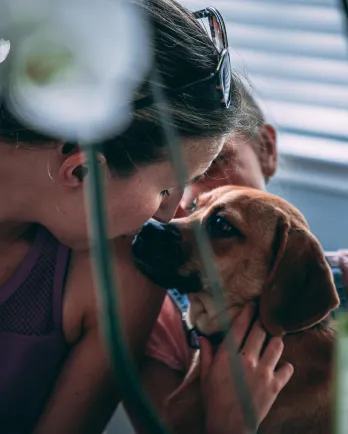Things to Consider Before Adopting a Special-Needs Dog
Editor's Note: This is a guest post on the Grey Matters Blog and not written by anyone affiliated with Grey Muzzle. We allow guest contributors from time to time in order to provide our supporters with a wide range of topics pertaining to senior dogs.
Adopting a special-needs animal is a noble act of compassion like no other, but understandably, it’s not for everyone. Taking care of a nondisabled pet is a journey enough. Adopting pets with special needs requires your utmost patience and willingness to give them a loving home despite the challenges that come with it.
Disability among special-needs animals ranges from the physical to behavioral. There are those who are born deaf or have missing limbs. There are others with underlying medical conditions that require their owners to be extra mindful of their diet. There are also those who were found to be “difficult” by previous owners, possibly due to past trauma.
All these mean that adopting a special-needs pet comes with its own sacrifices. If you’re considering the possibility of welcoming one in your home, keep the following things in mind before you make the commitment.
Taking Care of a Special-Needs Pet Will Cost You Money
Some sensorially challenged pets may require specific training. Physically challenged dogs, such as those with missing limbs, are prone to developing weight problems and thus may require special exercise programs. Those with chronic illness have to be given extra home-care services.
Some pets may require special diet programs. Not to mention, the vet services will possibly get hefty.
Examine your financial health to determine if you will be capable to take on the responsibility. Get plenty of advice from special-needs-pet parents to get an idea of how much the cost can tally up.
You Need to Be Emotionally Ready
Having a pet is an emotional affair. Dog parents bond with their pets for a lifetime; thus, death often becomes a heartbreak. Some do not recover from the loss even years after their pet’s passing.
When you take on a pet with special needs, you need to keep in mind that their time with you may be limited. It’s an emotional risk that can have serious psychological—and even physical—consequences for you and your family.
The Whole Family Must Be Okay with It
With the risk in mind, the entire family has to be on board with the decision to adopt. Because your pet will need more care than a pet without disability does, enlisting the family’s help in making your home accommodating and safe will make the task easier for everyone.
You will have to create house rules around taking care of your pet and see to it that everyone understands and commits to it.
Your Lifestyle Should Accommodate the Special Needs of Your Pet
A special-needs pet generally needs more attention and care. They need more hours of supervision and tending to every day. This means that, as their primary caregiver, you should be able to work around your schedule so their day-to-day needs are met, not just physically but in all aspects of life, including play.
If your lifestyle is not flexible enough and you will have to employ a sitter’s help most of the time to accommodate your pet’s needs, perhaps the decision should be reconsidered. Being handled by multiple people can be stressful and maybe even dangerous to the animal.
Full dedication and time are necessary to make the arrangement work for you and your pet.
Know Your Why
When mulling over a decision that involves another life, it’s best to be up front with yourself. What makes you want to reach out and offer a forever home to a pet with disabilities? What are your motivations? Why are you drawn to make such a sacrifice?
Most of these pets have bounced from home to home and may have formed trust issues. Don’t be just another heartbreak. Be honest with your motives to see if you’re really up to the task.
Final Word
Taking care of a pet is a wonderful experience that people should at least experience once in their lives. The responsibility of taking care of another life is paid back a thousandfold with the ceaseless love and uncomparable companionship they are able to give back. This remains true regardless of whether your pet has special needs or not.
However, the many realities of life can also get in the way of giving these animals the good life they deserve. So before you jump into action, consider these things first. It’s a huge responsibility by any measure and should thus be treated so with serious consideration.
About the Contributor:
Emma Nolan is a writer covering pet training, health, and lifestyle.
She is the proud dog mom of three adorable black Labradoodles and an eternally anxious-looking brown dachshund.
You can find her on Medium.




